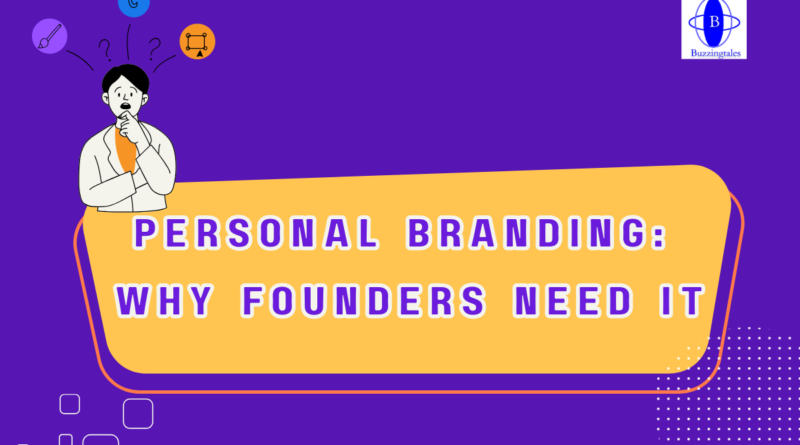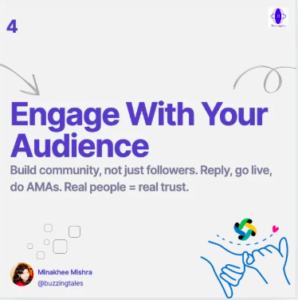Personal Branding: Why Founders Need it
One of the first things you should stress on while helping a startup in content marketing is to assist the founders to build a killer personal brand. For startup founders, a strong personal brand can be the difference between obscurity and recognition, influencing everything from investor interest to customer loyalty. Why? The simple answer is that if the founder is known and respected in the community then people are more likely to trust your startup and product. It gives founders the opportunity to become the magnets for their businesses. Personal branding involves strategically presenting oneself to build credibility, trust, and a unique identity that resonates with various stakeholders.
This article delves into five compelling reasons why personal branding is indispensable for founders, supported by real-life examples and data from the Indian startup landscape. Additionally, it outlines a five-step guide to help founders embark on their personal branding journey effectively.
Personal Branding: Because People Trust You Not Your Logo
Trust and credibility are foundational to any business relationship. For startup founders, establishing a personal brand that exudes authenticity and expertise can significantly enhance their reputation. When founders share their stories, values, and visions transparently, they humanize their brand, making it more relatable and trustworthy. People relate to people, and people buy from people.
Take the example of Varun Agarwal, the co-founder of Alma Mater. Through his book, “How I Braved Anu Aunty and Co-Founded a Million Dollar Company,” Varun shared his entrepreneurial journey, challenges, and successes. This candid narrative not only resonated with readers but also established him as a credible figure in the startup community. His personal brand, built on authenticity and relatability, played a pivotal role in Alma Mater’s growth and popularity.
Similarly, Sorav Jain, a digital marketing expert and founder of Digital Scholar, has leveraged his personal brand to build trust among his audience. By consistently sharing valuable insights and engaging content on social media, he has positioned himself as a thought leader in the digital marketing space, attracting clients and followers alike.
In essence, a well-crafted personal brand fosters trust and credibility, essential components for any founder aiming to make a lasting impact.
Personal Branding: Because Investors & Partners Google You First
Investors and potential partners often invest in people before they invest in ideas. A founder’s personal brand can significantly influence investment decisions and partnership opportunities. When founders are visible, articulate, and demonstrate thought leadership, they instill confidence in their capabilities and vision.
Radhika Aggarwal, co-founder of ShopClues, exemplifies this. As India’s first woman to enter the Unicorn Club, her personal brand as a resilient and innovative entrepreneur has been instrumental in attracting investors and partners. Her background in advertising and public relations, coupled with her transparent communication style, has made her a trusted figure in the startup ecosystem.
Another notable example is Sarvesh Shashi, founder of SARVA, a yoga and wellness startup. His personal brand as the “Modern Yogi” has not only garnered a massive following but also attracted investments from celebrities like Jennifer Lopez and Malaika Arora. By aligning his personal brand with his company’s mission, Sarvesh has successfully positioned SARVA as a global wellness brand.
These examples underscore the power of personal branding in opening doors to funding and strategic collaborations.
Personal Branding: Pull Talent Without Saying ‘We’re Hiring’
A founder’s personal brand can significantly influence a startup’s ability to attract and retain top talent. When founders are perceived as visionary, authentic, and inspiring, they naturally draw individuals who align with their values and mission. Moreover, a strong personal brand can foster a sense of pride and loyalty among existing team members.
Personal Branding: Turning Trust into Transactions
One of the most tangible benefits of personal branding for founders is the direct impact it can have on business growth and sales. When a founder positions themselves as an industry expert or a relatable visionary, they draw attention—not just to themselves but also to their company. In B2B markets, where trust and reputation carry immense weight, a founder’s personal brand can be a game-changer.
Take the example of Bhavish Aggarwal, co-founder of Ola Cabs. His visibility and active engagement on platforms like LinkedIn and Twitter helped personalize the brand of Ola. He openly discusses mobility trends, environmental issues, and the future of electric vehicles. This transparent and passionate approach humanizes the company, making stakeholders and users more likely to trust the brand and use its services. His personal advocacy for Ola Electric has helped it carve out a niche in India’s EV space, with the company seeing more than 1 lakh bookings within 24 hours of launch (Source).
Another great example is Ankur Warikoo, the founder of Nearbuy. Even after stepping down from the company, his personal brand remained strong. Through his candid posts about entrepreneurship, personal finance, and failures, he created a loyal audience. This community has now become a consistent support base for his digital products, including online courses and books. His personal brand became a business pipeline. His YouTube channel alone has over 2.4 million subscribers, translating to direct influence and reach in the B2B ecosystem (Source).
When a founder leads with their personality and values, it creates a ripple effect. Followers become customers, and those customers become advocates. Sales today aren’t just about transactions; they’re about relationships. And nothing builds relationships faster than a compelling personal brand.
Pesonal Branding: The Best PR During Crisis
Every startup hits rough patches. Markets crash. Products fail. Teams fall apart. But what often helps a company weather the storm is the strength of its founder’s brand. A founder with a trustworthy and empathetic personal brand can steer public perception, rebuild stakeholder confidence, and lead recovery from crises with integrity.
Look at Kunal Shah, founder of CRED. Despite facing criticism for the company’s valuation and profitability model, Kunal’s openness on social media platforms like LinkedIn and Twitter allowed him to engage in honest, transparent conversations. His posts are often introspective, questioning startup culture, discussing business models, and demystifying venture capital funding. Because of this, he has created a personal brand that exudes intellectual honesty. CRED has raised over $801 million to date despite skepticism from traditional analysts (Source)—proof of how a strong personal brand can cushion a startup during criticism and help it bounce back stronger.
During the COVID-19 pandemic, Nithin Kamath, co-founder of Zerodha, used his personal brand to communicate with users and employees, reinforcing trust. Instead of cutting jobs or salaries, Zerodha froze hiring and offered sabbaticals. His philosophy of “less is more” and his public communication through blogs and Twitter helped strengthen Zerodha’s brand as a people-first company. This approach not only earned them customer loyalty but also helped retain top talent. In fact, Zerodha remains one of the most profitable brokerages in India, making ₹2,900 crore in profits in FY23 (Source).
Resilience isn’t built in the boardroom. It’s built through trust, transparency, and consistency—traits that are at the heart of personal branding.
How to Build a Personal Brand in 5 Steps
Now that we’ve covered the “why,” let’s talk about the “how.” Building a personal brand doesn’t require celebrity status. What it requires is clarity, consistency, and the courage to show up authentically. Here’s how founders can start:
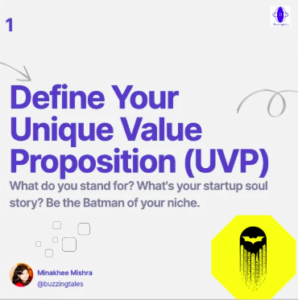
Step 1: Define Your Unique Value Proposition (UVP)
Before anything else, ask yourself: What do you want to be known for? What’s your story? What values guide your decisions? Your UVP should answer three questions:
Who are you?
What do you do?
Why should people care?
For example, Nithin Kamath’s UVP is being a transparent and frugal fintech founder who champions bootstrapping. His messaging and online presence always reflect this identity. Get clear about your niche and lean into it.
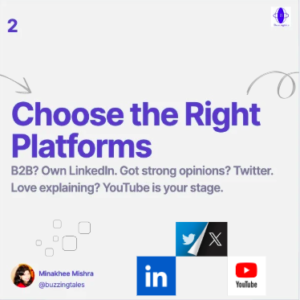
Step 2: Choose the Right Platforms
Not every platform suits everyone. If you’re a B2B founder, LinkedIn is non-negotiable. It’s where investors, clients, and potential hires hang out. If you’re visually expressive or enjoy storytelling, Instagram and YouTube can amplify your reach.
For example, Warikoo has aced YouTube with long-form value-based content, while Kunal Shah uses Twitter/X for sharp, opinionated insights. Pick platforms that suit your style and where your audience already lives.
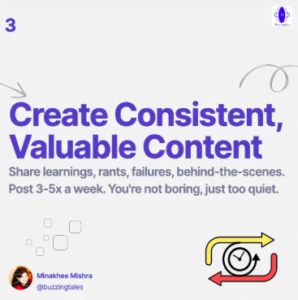
Step 3: Consistent Content Creation
People won’t know your story unless you tell it regularly. Start small:
- Share your journey (wins, failures, learnings)
- Educate your audience with tips or industry insights
- Showcase your company’s behind-the-scenes efforts
- Go live or host Q&As
Use a simple content calendar and post 3–5 times a week. The goal isn’t virality, it’s consistency. Over time, you’ll see compounding results.
Step 4: Engage with Your Audience
A brand isn’t just what you say; it’s what people remember about you. Respond to comments, join relevant groups, and collaborate with others in your space. Engagement builds community, and community builds trust.
Hosting AMA (Ask Me Anything) sessions, going live on LinkedIn, or doing collaborations with other founders can make your brand feel alive and accessible.
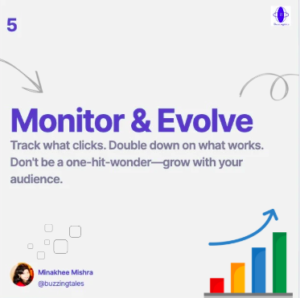
Step 5: Monitor and Evolve Your Brand
Use tools like LinkedIn Analytics, Twitter Metrics, or even basic Google Alerts to track how your personal brand is performing. Are people engaging? Are they sharing your posts? Are they sending you DMs or business inquiries?
Don’t be afraid to pivot. Just as startups evolve, so should your personal brand. Update your bio, refresh your content themes, and stay relevant.
Personal Branding: Less Show-Off, More Show Up Strategically
In today’s hyper-connected business world, founders can no longer afford to remain faceless. Personal branding is not a vanity project—it’s a strategic advantage. It builds trust, attracts opportunities, helps navigate crises, and drives tangible growth.
From India’s thriving startup ecosystem, we’ve seen founders like Kunal Shah, Ankur Warikoo, and Radhika Aggarwal turn their personal credibility into corporate currency. They show us that when founders own their stories, the world listens—and buys in.
Whether you’re just starting out or running a unicorn, your story deserves to be heard. And the time to tell it is now.
FAQs
1. What is personal branding?
Personal branding is the practice of marketing yourself—your experiences, values, and personality—as a brand. It’s how others perceive you based on the content you share, the way you communicate, and your presence both online and offline.
2. Why is personal branding important for startup founders?
It helps founders build credibility, attract investment, drive sales, hire better talent, and handle crises more effectively. In short, people do business with people they trust—and a personal brand is how that trust is built.
3. How can I start building my personal brand?
Start by defining your value proposition. Choose one or two social platforms. Share consistent, valuable content. Engage with your audience and evolve based on feedback and data.
4. What platforms are best for personal branding?
For B2B founders, LinkedIn is essential. Twitter is great for thought leadership. YouTube and Instagram work well if you’re comfortable with video or visuals.
5. How does personal branding impact my startup’s success?
A strong personal brand makes your startup more relatable and trustworthy. It increases your visibility, brings in partnerships, and drives traffic and leads—all contributing to long-term success.

